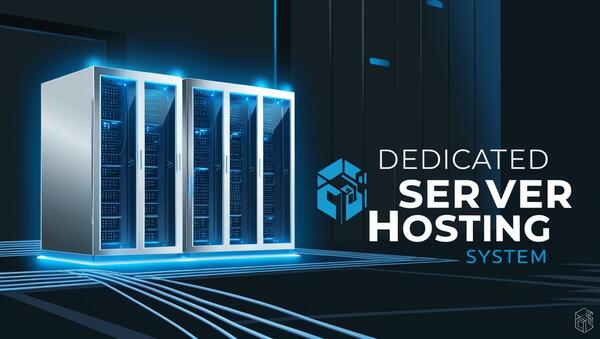ALL BUSINESS
COMIDA
DIRECTORIES
ENTERTAINMENT
FINER THINGS
FREE CREATOR TOOLS
HEALTH
MARKETPLACE
MEMBER's ONLY
MONEY MATTER$
MOTIVATIONAL
NEWS & WEATHER
TECHNOLOGIA
TV NETWORKS
VIDEOS
VOTE USA 2026/2028
INVESTOR RELATIONS
ALL BUSINESS
COMIDA
DIRECTORIES
ENTERTAINMENT
FINER THINGS
FREE CREATOR TOOLS
HEALTH
MARKETPLACE
MEMBER's ONLY
MONEY MATTER$
MOTIVATIONAL
NEWS & WEATHER
TECHNOLOGIA
TV NETWORKS
VIDEOS
VOTE USA 2026/2028
INVESTOR RELATIONS
 Sanoja Kumar -
Fri at 1:10 PM -
Technology -
webhosting
Hosting Server
Dedicated Server
dedicated server hosting
-
25 views -
0 Comments -
0 Likes -
0 Reviews
Sanoja Kumar -
Fri at 1:10 PM -
Technology -
webhosting
Hosting Server
Dedicated Server
dedicated server hosting
-
25 views -
0 Comments -
0 Likes -
0 Reviews

Selecting the right dedicated server hosting for your business is a crucial decision that impacts performance, security, and scalability. Unlike shared hosting, a dedicated server provides exclusive resources, giving businesses full control over configurations, security measures, and overall server performance. Choosing the right server requires evaluating factors such as hardware specifications, bandwidth needs, security requirements, and budget constraints. This guide will help you navigate the essential aspects of dedicated server selection to make an informed decision.
A dedicated server is a physical server solely allocated to one business or user. Unlike shared or VPS hosting, where multiple users share resources, a dedicated server ensures high performance, enhanced security, and greater flexibility. It is ideal for businesses running high-traffic websites, complex applications, or those requiring strict data compliance and security.
A dedicated server ensures that all computing resources—CPU, RAM, and storage—are dedicated to your business alone. This results in faster load times, improved website performance, and reduced downtime, making it ideal for businesses that handle large volumes of traffic or resource-intensive applications.
With a dedicated server, you have full control over security configurations. You can implement custom firewalls, intrusion detection systems, and strict access controls, reducing the risk of cyber threats and unauthorized access. This is particularly important for businesses handling sensitive data.
Unlike shared hosting, where configurations are predetermined, dedicated servers allow businesses to choose their operating system, software, and hardware components. This level of customization ensures that the server meets your exact business needs.
As businesses grow, so do their hosting requirements. A dedicated server provides the flexibility to upgrade resources such as RAM, storage, and bandwidth, ensuring smooth operations even as traffic and data requirements increase.
Dedicated servers come with a unique IP address, which enhances website security and SEO performance. Unlike shared hosting, where multiple users share an IP, a dedicated IP prevents risks associated with blacklisted IP addresses due to the actions of other users.
Evaluate the nature of your business operations. If you run high-traffic websites, eCommerce stores, or large databases, opt for a server with high processing power, ample RAM, and SSD storage for better performance.
The CPU and RAM determine how efficiently your server handles multiple tasks. Businesses requiring complex computations or high-speed processing should consider multi-core processors like Intel Xeon or AMD EPYC, along with at least 16GB of RAM for optimal performance.
There are two main types of storage options:
For businesses requiring fast performance, SSDs are the preferred choice. Additionally, assess your storage needs based on data volume and future expansion plans.
Bandwidth determines how much data can be transferred between your server and users. Businesses with high traffic should opt for unlimited or high-bandwidth plans to avoid slow load times and potential downtime.
A dedicated server should include robust security measures, such as:
Choosing a hosting provider that offers strong security features ensures better protection against cyber threats.
Dedicated servers support different operating systems, including:
Select an OS that aligns with your business needs and software compatibility.
Regular backups protect business data from unexpected failures or cyberattacks. Look for a dedicated server provider offering automated backups, redundancy options, and disaster recovery solutions to ensure business continuity.
Reliable 24/7 customer support is essential for handling technical issues. Check the hosting provider’s SLA to ensure they offer guaranteed uptime (99.9% or higher), responsive support channels, and minimal downtime risk.
When choosing a dedicated server, you need to decide between managed and unmanaged hosting:
Dedicated servers are more expensive than shared or VPS hosting due to their exclusive resources. Prices vary based on hardware configurations, bandwidth, security features, and management services. Compare different providers to find a balance between cost and performance.
Several hosting companies offer reliable dedicated server solutions. Some of the top providers include:
Evaluate their pricing, features, and customer support before making a decision.
Choosing the right dedicated server requires careful assessment of performance needs, security measures, scalability, and budget constraints. A dedicated server offers businesses the advantage of high-speed performance, enhanced security, and complete control over configurations. Whether you opt for managed or unmanaged hosting, selecting the right provider ensures seamless operations and long-term business success.
If you are ready to enhance your online presence, it's time to buy dedicated server hosting that meets your business requirements and future growth plans.

